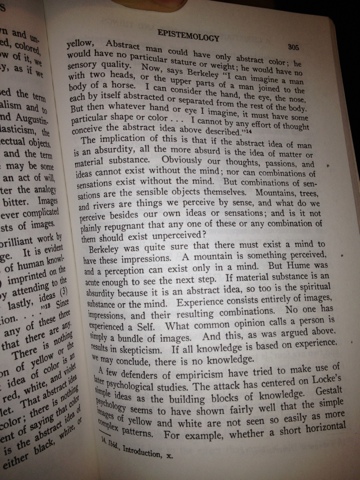Either,
(1) universals reduce to particulars, or (2) universals and particulars are distinct.
If (1) is the case, then some form of nominalism is true. If (2) is true, some form of either realism or conceptualism is true.
Given (1), abstractionism asserts universals are formed by particulars. An agent encounters a particular via sense perception and then by inference abstracts a universal. For example, Sally sees a particular human, then infers from this general characteristics that form the concept of humanity. Universal concepts are allegedly open-ended, they point to an indefinite number of things.
Problems
The term abstraction is vague. It does not analytically explain the process in which universals are formed from particulars. Moreover, a logical definition of the term cannot be provided.
Logically how can one abstract concepts, like time, space, and color, from particular sensations?
To say universal concepts are open ended is to confuse semantics with ontology. The issue is not if words are vague in picking out concretes; rather, the issue is if words in fact pick out universal concepts that exist.
How can one from sensations infer perceptions and abstractions and then determine if the perceptions are in fact true? Kant had a similar problem with his Ding an sich.
Abstraction presupposes there are persons with minds, sensations, beliefs, thoughts, and intentionality without setting forth a metaphysical view that can account for such things. But logically prior to giving reasons for abstraction, one must logically justify empiricism.
Problems
The term abstraction is vague. It does not analytically explain the process in which universals are formed from particulars. Moreover, a logical definition of the term cannot be provided.
Logically how can one abstract concepts, like time, space, and color, from particular sensations?
To say universal concepts are open ended is to confuse semantics with ontology. The issue is not if words are vague in picking out concretes; rather, the issue is if words in fact pick out universal concepts that exist.
How can one from sensations infer perceptions and abstractions and then determine if the perceptions are in fact true? Kant had a similar problem with his Ding an sich.
Abstraction presupposes there are persons with minds, sensations, beliefs, thoughts, and intentionality without setting forth a metaphysical view that can account for such things. But logically prior to giving reasons for abstraction, one must logically justify empiricism.
It is impossible to show logically that universals come from particulars. Since such a demonstration would rely on induction which assumes the very thing one needs to prove, namely that one can get universals from particulars.
Gordon H. Clark's thoughts on the subject from his "A Christian View of Men and Things."
Gordon H. Clark's thoughts on the subject from his "A Christian View of Men and Things."



No comments:
Post a Comment